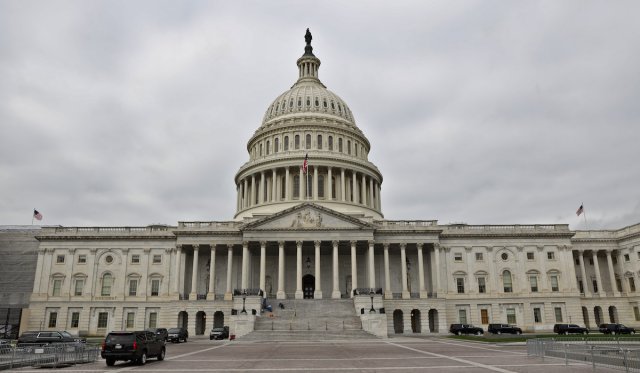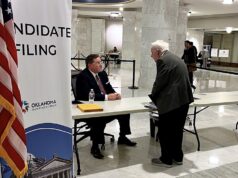WASHINGTON — The House of Representatives held the first open hearings of the impeachment inquiry this week, but members of the Oklahoma delegation were wary of the approaching budget deadline that would appropriate federal funds for the 2020 fiscal year.
On Wednesday, the House Intelligence Committee heard testimonies from the top U.S. diplomat in Ukraine William B. Taylor Jr. and Deputy Assistant Secretary for European and Eurasian Affairs George Kent.
This story was reported by Gaylord News, a Washington reporting project of the Gaylord College of Journalism and Mass Communication at the University of Oklahoma.
While both Democratic and Republican members of the committee asked questions largely along partisan lines, both witnesses were less eager to take a side.
“I am a career non-professional who serves whatever president is duly elected and carries out foreign policies of that president in the United States, and I have done that for 27 years for three Republican presidents and two Democrat presidents,” Kent said in response to President Donald Trump’s claim that both witnesses were “Never Trumpers.”
In the hearings, Taylor and Kent said that neither directly interacted with Trump during the alleged quid pro quo, but both did express that Trump’s actions caused reason for concern.
New information did arise during Wednesday’s testimony, however, when Taylor mentioned a July 26 phone call, separate from the call that ignited the impeachment flame, between Trump and U.S. Ambassador to the Eurporean Union Gordon Sondland.
“A member of my staff could hear President Trump on the phone asking Ambassador Sondland about ‘the investigations,’” Taylor said during his testimony. “Ambassador Sondland told President Trump that the Ukranians ‘were ready to move forward.’”
Oklahoma Republicans respond to impeachment testimonies
Following Wednesday’s hearing, Republican representatives from Oklahoma released statements regarding the testimonies.
“In my view, the hearing didn’t reveal anything that rises to the level of an impeachable offense. Moreover, neither witness had direct knowledge of President Trump’s call with President Zelensky,” Rep. Tom Cole (R-OK4) said in a statement. “But we still know that both leaders said there was no pressure and that Ukraine received the military aid without any required action. At this point, I remain more concerned about the unfair and unprecedented process by which House Democrats continue to pursue impeachment.”
Similarly, both Rep. Frank Lucas (R-OK) and Rep. Markwayne Mullin (R-OK2) expressed discontent with the impeachment process.
“After the hearing, the Congressman believes nothing was revealed that rises to the level of an impeachable offense,” Patrick Bond, communications director for Lucas said. “The Congressman remains concerned about the unfair process by which House Democrats continue to pursue this partisan impeachment.”
Mullin took to social media to blast this week’s hearings, saying there is no proof of a quid pro quo or high crimes and misdemeanors.
“There’s nothing new here,” said Mullin in a video posted to his Twitter. “What they’re afraid of, is if they don’t impeach the President of the United States, that he will get reelected.”
On Friday, former U.S. Ambassador to Ukraine Marie Yovanovitch also testified that Trump’s personal lawyer Rudy Gulliani spread false information about her, which led to her being removed from her position prior to the July phone call.
Trump took to Twitter during Yovanovitch’s testimony, criticizing her past work as an ambassador.
“Now the president, in real time, is attacking you,” Rep. Adam Schiff (D-CA28) said during the hearing before claiming the president’s action could qualify as witness intimidation. “What effect do you think that has on other witnesses’ willingness to come forward and expose wrongdoing?”
“Well, it’s very intimidating,” Yovanovitch responded.
Oklahoma delegates urge Congress to pass budget deal
While impeachment has remained in the national spotlight, Congress also faces a Nov. 21 deadline to reach a budget deal for the 2020 fiscal year.
“Lost in all of this impeachment circus is the fact that the government actually runs out of money next week and could potentially shut down,” Cole, who is vice ranking Republican of the House Appropriations Committee, said in a video posted to Twitter.
Although Cole said he believes Congress will ultimately avoid a shutdown, progress still needs to be made before the end of the year.
Rep. Kendra Horn (D-OK5) sent a letter to both House and Senate leaders on Thursday, urging Congress to pass a budget deal instead of another continuing resolution before next week’s deadline.
“For far too long, Congress has been content to kick the can down the road and pass short-term continuing resolutions that extend the possibility of a government shutdown,” Horn wrote in a letter. “Congress must stop playing politics with peoples’ livelihoods and focus on providing Americans with the peace of mind they deserve.”
Earlier this year, the government shut down for 35 days — making it the longest shutdown in history — when Congress failed to agree on funding for a wall at the border, the same issue that is stalling a budget deal now. If another were to occur, this would be the fourth government shutdown during Trump’s presidency.
During the previous shutdown, thousands of residents in Horn’s district were furloughed, working without pay or covering for those who could not afford childcare without income, according to the letter. If another were to occur, Horn wrote that it would impact millions of Americans.
“Funding the federal government is one of our constitutional responsibilities and a fundamental role of Congress,” wrote Horn.
The latest short-term spending bill is expected to be voted on next week, but the resolution would only last only until Dec. 20.























